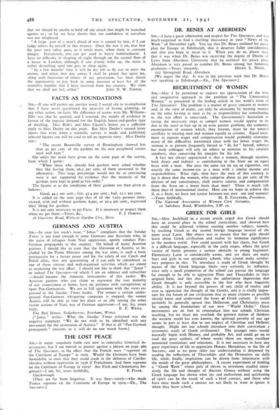FACTS AS FOUNDATIONS
SIR,—If you will permit me anther word, I would tike to re-emphasise that I have never questioned the necessity of basing planning, or any other action, on facts. My difference of acceru wilt, Mr. Williams- Ellis was that he queried, and I asserted, the weight of evidence in favour of the popular demand for the English house-and-garden type of dwelling. Miss Ryle's and Miss Upcott's letters are a sufficient reply to Miss Denby on this point. But Miss Denby's second letter shows that even when a scientific survey is made and published, selected figures can still be used to tell an opposite story. Miss Denby says:
" The recent Bournville survey of Birmingham showed less than 45 per cent, of the gardens on the new peripheral estates were well kept."
She omits the main facts given on the same page of the survey, from which I quote:
" When those who already had gardens were asked whether they like having them, 96.3 per cent. of them answered in the affirmative. This large percentage would not be so convincing were it not supported by evidence that the majority of the gardens were kept in good or fair order."
The figures as to the conditions of their gardens are then given as follows:
Good, 44.5 Der cent.; fair, 43.4 per cent.; bad, 12.1 per cent. It is added on the next page that of all the 7,023 persons inter- viewed, with and without garden; 6,491, or 92.4 per cent., expressed their liking for gardens.
It is not only necessary to get Facts. It is necessary to respect them
when we get them.—Yours, &c., F. J OSBORN. i6 Guessons Road, Welwyn Garden City, Hens


























 Previous page
Previous page